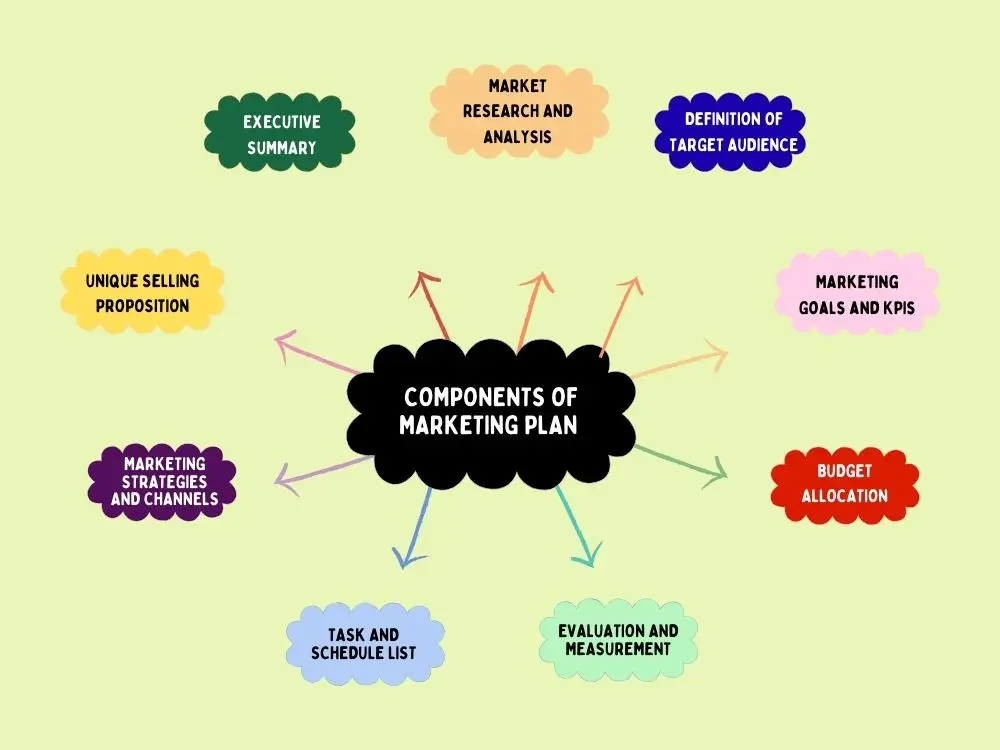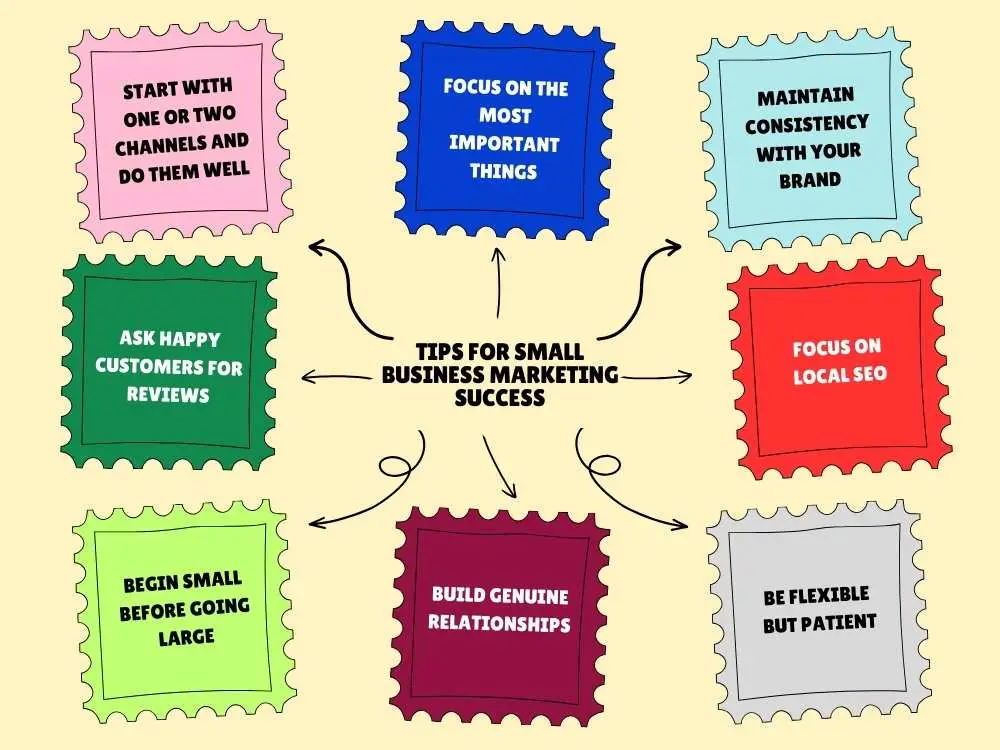
Small Business Marketing Plan: Examples + Free Tools to Help You Succeed
Does your small business stand out in this overcrowded market? It's common for a lot of small business owners who feel paralyzed when it comes to marketing. They're also uncertain where to start or how best to use their meager budgets.
Here's where an effective marketing plan comes into play. When implemented wisely and with the right tools, it can generate real results for your own business. We'll guide you through some proven marketing plan examples, along with free tools that will help you attract more customers and grow your business.
Key Takeaways
- Discover the fundamental elements of a small business marketing plan.
- Use proven examples from thriving small firms to steer your marketing plan and prevent frequent mistakes.
- Discover free tools for keyword research, text analysis, and image optimization to enhance your marketing initiatives.
- A flow chart example of a seven-step procedure for creating your marketing plan from scratch.
- Find out 8 useful strategies that successful small business owners use to expand their clientele and boost revenue.
What is a Small Business Marketing Plan?
A marketing plan is simply your written guide on how you are gonna reach customers and grow the business. It determines the people you want to target, the method you will use, and what you must spend to initiate the sales conversion.
- Purpose: This plan keeps your marketing efforts on track to not wasting money on anything that won't be of use to your specific business.
- Different from strategy: Strategy tells you how you want to win customers in general, while your plan states how, when, and with what resources you will implement your strategy.
- Common mistakes: A lot of small businesses don't focus on their customers' needs and try to market everywhere. Some copy big companies without thinking about their budget constraints, and build plans that are never updated or acted upon.
If companies have great marketing plans, they will help achieve sustainable business growth.
Key Components of an Effective Marketing Plan

A marketing plan won't work if some essential components don't fall into place. Let's see them one by one:
- Executive Summary: This is a synopsis of your overall marketing strategy that emphasizes your main goals and methodology.
- Market Research and Analysis: This entails studying your sector, rivals, and the trends that are influencing your business.
- Definition of Target Audience: Determining your target customer, where they are, as well as issues that must be addressed.
- Unique Selling Proposition (USP): The uniqueness of your product or business when compared with your rivals in the customer's mind.
- Marketing Goals and KPIs: Specific goals and objectives. For example, grow sales to 20 percent, or gain 100 new customers.
- Marketing Strategies and Channels: How you attempt to entice possible clients, and how you use different channels such as social networks, e-mail, or plain old-fashioned neighborhood posters.
- Budget Allocation: The amount that you are going to pay for each marketing activity.
- Task and Schedule List: The timeline for starting the campaigns and the responsible individuals.
- Evaluation and Measurement: The way you intend to monitor progress and modify the plan as required.
Real-Life Examples of Small Business Marketing Plans
By examining what's effective for other successful small businesses, you can get ideas for your own company marketing efforts. Let's see 3 real strategies on which other businesses thrived.
1. Local Bakery Using Social Media & Influencer Partnerships
Sweet Magnolia Bakery in Nashville started as a small local bakery but grew to have lines around the block after partnering with local influencers who had 10,000-50,000 followers. The business treated the influencers with free cupcakes in exchange for a few Instagram reviews.
This cost them only around $200 monthly but generated some new sales prospects worth about $3,000 monthly. They knew their secret was reaching local micro-influencers instead of aiming for everyone.
2. Online store using SEO and email marketing
A handmade jewelry company called Luna Crafts boosted its sales by 180% over 18 months by creating informative blog posts about jewelry care and fashion advice. They also sent out weekly emails to clients with relevant information and special offers.
Their monthly marketing costs were only $300 for email software and SEO tools, but they produced a good five-figure amount in monthly sales.
3. Freelance service using content marketing and referrals
A freelance graphic designer built a six-figure business by sharing design tips on LinkedIn and asking satisfied clients for referrals. She spent at least two hours daily creating helpful posts.
Plus, she always asked clients to recommend her services. This approach cost her nothing but time, yet brought in 40% of her new clients through referrals and 35% through social media connections.
How to Create Your Own Marketing Plan (Step-by-Step)
Free Tools to Supercharge Your Marketing Plan
You don't need expensive software to create a winning marketing plan. Here are our free tools that can help you plan and execute your marketing strategy without a massive cost.
- Keyword Tools: Using our keyword tools, you can easily discover what your customers are really looking for. These tools help you find the right words to use in your ads and content, rather than just assuming what people are looking for.
- Image Tools: Optimize images and create awesome graphics without the need for a designer. Your company seems reputable when you have excellent graphics, and your material is more likely to be shared on social media.
- Text Analysis Tools: These tools enable you to produce content that connects with your audience and yields better results. Enhance your marketing material by analyzing readability, tone, efficiency, and other factors.
Tips for Small Business Marketing Success
It shouldn't be a difficult thing to do marketing for your small business. The following tips are useful for properly doing marketing and ensuring business success.

- Start with one or two channels and do them well: You must avoid trying to be everywhere at once by spreading yourself too thin. Choose the one where your customers spend most of their time and concentrate on that area.
- Focus on the most important things: Monitor key areas like calls, web traffic, leads, sales, etc. Monitoring these areas is important for growth.
- Maintain consistency with your brand: You have to maintain the same tone, color, message, and quality for your brand. This is how you can be easily recognized.
- Ask happy customers for reviews: Customers read online reviews before making a purchase. This is why you should ask your satisfied customers to leave positive reviews to enhance your brand image.
- Focus on local SEO: Create your Google My Business (GMB) profile and optimize. This lets people easily find you when looking for businesses within your location.
- Build genuine relationships: Without merely making commercial transactions, try to remember your customers' names, follow up on purchases, send gifts, greetings, and always genuinely resolve customer complaints.
- Begin small before going large: It's always best to test small with something like a Facebook advertising campaign or sending out 50 emails first before putting in large dollars. Learn first what works.
- Be flexible but patient: Allow some time for your marketing to do its work. However, if your strategies fail to work, you should be flexible to make changes.
Wrapping Up
A small business marketing plan is a vital tool that turns your marketing efforts into actual growth. It provides you with a straightforward path forward without costing a lot of money or requiring expensive tools. You'll make genuine progress if you take consistent action and are open to changing things up as necessary. Start developing your plan and stay committed to see your firm thrive.
FAQs
Q1: What amount should a small business invest in marketing?
There is no standard for this. However, many firms invest 3–5% of their revenue in marketing. If you're just starting out, you have to invest more than this to beat the competitors. Begin small with one or two channels that appeal to your target market, and then grow as you get positive results.
Q2: When does a marketing strategy start to produce results?
It usually takes time, like three to six months of consistent effort, to see any good improvement. However, you may see some early results in four to six weeks. Brand building and SEO take longer to produce results, but they offer long-term value. Plus, digital marketing channels like social media and email may yield faster returns.
Explore Related Posts
https://smarttoolsai.com/post/small-business-quotes
https://smarttoolsai.com/post/marketing-automation-techniques
.webp)